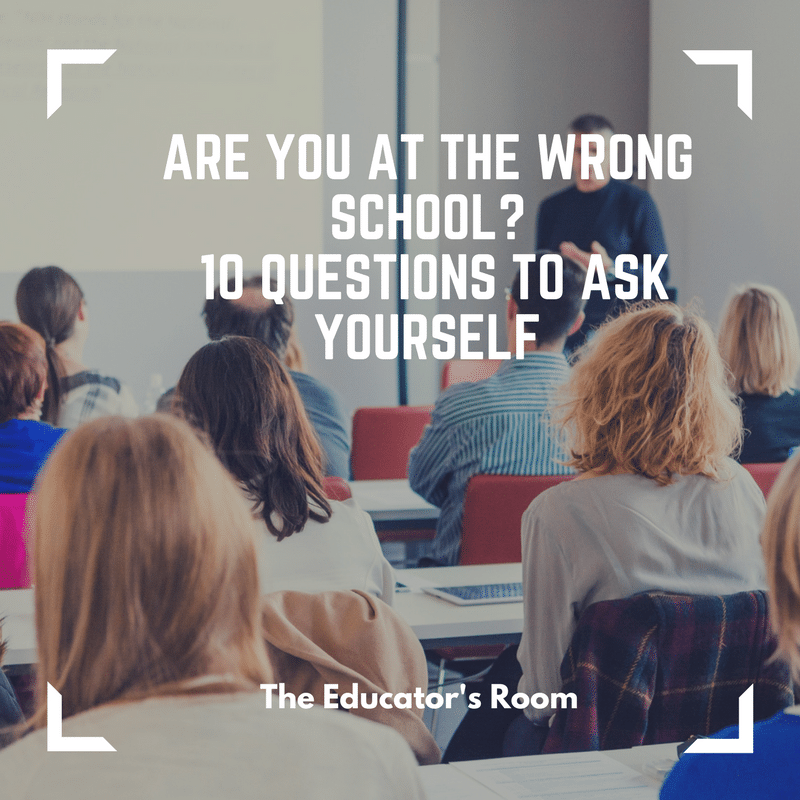Dictionary.com defines a school as “an institution where instruction is given, especially to persons under college age.” But a school is so much more than that for a teacher. It isn’t just a structure housing our profession, it’s where we change students’ lives, root for the sports teams, and call a second home. It’s possibly a place where a teacher’s own children go to school. It’s an ample part of a teacher’s own professional and personal community. With that being said, how do teachers know that they’re at the right school? Better yet, how do they know they’re at the wrong school? Here are 10 questions to examine just that:
1. What is your relationship like with your principal?
Many things begin at the bottom, but we’re going to begin this story at the top. The principal often sets the tone for the school. Teachers may not always agree with the principal, but they certainly NEED to operate upon mutual respect. Many of us have excellent principals who serve as fine leaders and visionaries. But some of us do not. If the principal is there for the next 10 years, how will that impact the teachers’ jobs? For the better or worse? Teachers need to ask themselves that.
2. Do your colleagues respect one another?
Just like principals and teachers don’t always have to be best buddies, neither do staff. But do teachers get along with one another? Do they smile, share, and keep students first? Do they do things outside of school? Do they make one another feel included?
3. What is the school culture and climate like?
Hopefully, “students” and “priority” seem to be right next to one another in that mission. Do the students seem to value coming to school? They should come first above everything else, and the culture of the school should indicate that. Similarly, a somewhat negative culture at the school is tolerable if teachers feel like the climate is changing for the better.
4. Do the parents and the community value teachers?
While pay is often the greatest indicator of such a value, it is not everything. Parents will often go out of their way to compliment the staff, share gifts, make food for them, or just send in a card of appreciation. Same thing with community members too, who are appreciative of the education of their neighbors. If you see a community that is up-in-arms against its teachers, look out. Teachers may be stepping into quicksand.
5. Can teachers envision their children going here?
Every teacher wants every child to receive a quality education. That, sadly, doesn’t happen everywhere in the world – or in America, for heaven’s sake. But if teachers send their own children to the school, it must be out of love for what the school provides. If they never would, then it’s a place they may never be fully invested in.
6. How transparent is the school?
Growing in importance is the transparency of schools. While backslapping and nepotism has vanquished from most schools, it still exists in some of them. Similarly, does it seem like the truth is available for everybody? It’s one thing to be at a poor performing school, but it’s another to be at one who try to muffle it and bury themselves in a bomb shelter.
7. Are the people there happy?
This seems like a wild question, but all teachers need to be challenged by their job. That’s why some go to inner city schools – to make the most impact with the neediest students. But make sure that teachers aren’t in over their heads. Many are right now, and they need a good collegiate structure to support one another to face the most difficult of storms at the school. Otherwise, they’ll wither on the vine from being overwhelmed.
8. Do you agree with the direction at the school?
Every school has a direction because every administrator has an agenda. Hopefully, teachers, students, parents, community members, and professionals are all included on this agenda, and that it moves the school in the proper direction to help the most students possible. Vision and direction may be the two most important things regarding the voyage of the school.
9. Will teachers teach there for the next 10 years?
Some places are just skipping stones until the next district opens up. With that said, an environment that encourages teacher retention also encourages student learning.
10. Why would you go anywhere else?
Be careful about the grass being greener on the other side. It almost always looks that way. However, if the grass the teachers, students, and the community sees as brown and moldy, it may be time for a new school.





